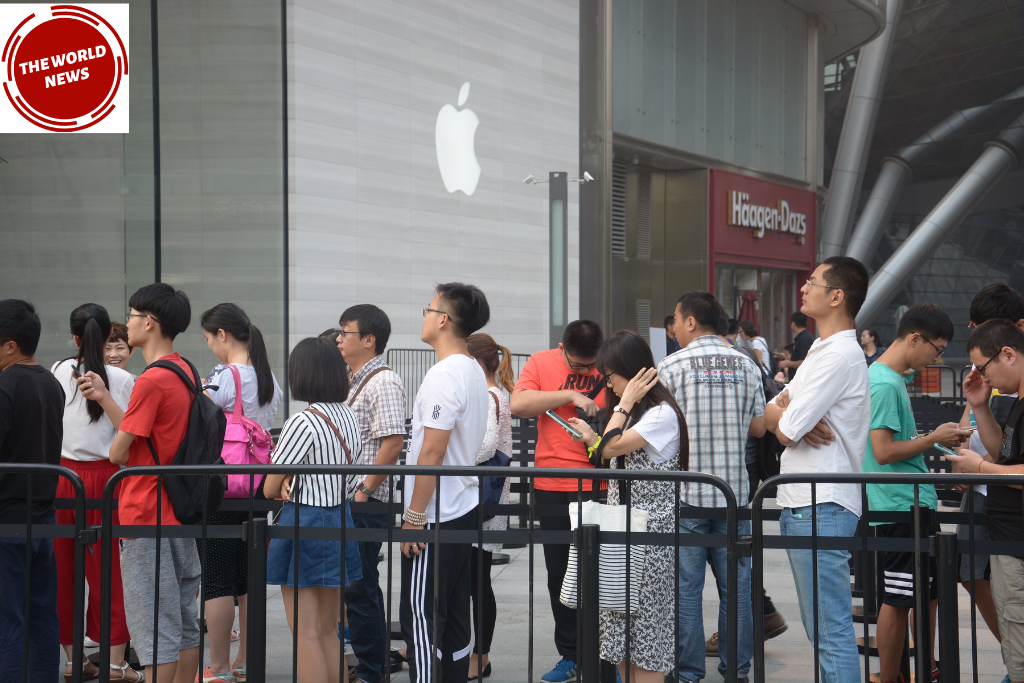Apple, the world’s most valuable company, has recently encountered a significant hurdle in one of its largest markets, China. Reports of a ban on Chinese government workers using iPhones have sent shockwaves through the tech giant’s stock market valuation, causing a drop of more than 6%, equivalent to nearly $200 billion in just two days.
We will delve into the details of this ban, its potential implications for Apple, the broader context of US-China tensions, and how these developments may impact the global technology landscape.
The iPhone Ban in China
The ban on Chinese government workers using iPhones emerged from two separate reports. The Wall Street Journal revealed that Beijing had instructed central government agency officials not to bring iPhones into the office or use them for work.
Subsequently, Bloomberg News suggested that this ban could extend to workers at state-owned companies and government-backed agencies as well. These reports arrived just ahead of Apple’s highly anticipated iPhone 15 launch, scheduled for September 12.
China’s Significance to Apple
China holds a pivotal role in Apple’s global operations. As the company’s third-largest market, it contributed to 18% of Apple’s total revenue in the previous year. Moreover, China serves as the primary manufacturing hub for Apple products, with Foxconn, one of the world’s largest electronics manufacturers, being Apple’s biggest supplier. Therefore, any disruption or decline in demand within the Chinese market can significantly impact Apple’s financial performance and supply chain operations.
The Stock Market Reaction
Apple’s stock market valuation, standing at close to $2.8 trillion, witnessed a sharp decline as news of the iPhone ban spread. Investors reacted swiftly to the uncertainty surrounding the situation, causing shares in Apple to tumble. This drop in Apple’s stock price was not isolated; it also affected companies within Apple’s ecosystem, such as Qualcomm, the world’s leading supplier of smartphone chips, and South Korea’s SK Hynix, a semiconductor manufacturer.
The US-China Tensions
The backdrop to this iPhone ban is the ongoing tensions between the United States and China. Earlier in the year, the United States, in collaboration with its allies Japan and the Netherlands, implemented restrictions on China’s access to vital chip technology.
In retaliation, China imposed restrictions on the export of two materials essential to the semiconductor industry. Furthermore, China is reportedly preparing a $40 billion investment fund to bolster its domestic chip manufacturing industry, signaling its determination to reduce reliance on foreign technology.
Huawei’s Unexpected Move
In a surprising turn of events, Chinese tech giant Huawei unveiled its Mate 60 Pro smartphone during US Commerce Secretary Gina Raimondo’s visit to Beijing. This move signifies China’s continued efforts to strengthen its position in the global technology sector.
Notably, the phone features a new 5G Kirin 9000s processor, developed for Huawei by China’s largest contract chipmaker, SMIC (Semiconductor Manufacturing International Corporation). Experts have praised this development as a significant milestone for China’s semiconductor industry.
Implications for Apple
The ban on iPhones for Chinese government workers and the uncertainty surrounding its potential expansion to other sectors raises several concerns for Apple. Here are some key implications:
- Revenue Impact: A decline in iPhone sales within China, a market that Apple heavily relies on, could negatively impact the company’s overall revenue. The ban may deter potential customers and lead to decreased demand for Apple’s products.
- Supply Chain Disruption: Given that China is Apple’s primary manufacturing hub, disruptions or reduced orders stemming from decreased demand could impact Apple’s supply chain, leading to potential delays in product releases and increased production costs.
- Brand Image: Apple has long positioned itself as a premium and innovative brand. Any negative publicity or association with geopolitical tensions can affect its brand image, potentially eroding consumer trust and loyalty.
- Global Market Sentiment: The news of the iPhone ban and its repercussions in China can affect global market sentiment. Investors may perceive Apple as more vulnerable to geopolitical risks, impacting its stock price and market capitalization.
- Competitive Landscape: This incident may provide an opportunity for Apple’s competitors to gain ground in the Chinese market. Local brands could capitalize on the ban to promote their products as more suitable alternatives for Chinese consumers.
Navigating Uncertain Waters
While the situation appears challenging for Apple, it’s essential to remember that the technology industry is marked by rapid change and geopolitical complexities. Apple has previously faced obstacles and adapted to various market conditions. To mitigate the impact of the ban and navigate uncertain waters, Apple can consider the following strategies:
- Diversification: Apple should continue to explore diversification in its product offerings and revenue streams. Expanding into services, wearables, and other technology sectors can help reduce reliance on iPhone sales in specific markets.
- Strengthening Alliances: Building and maintaining strong relationships with Chinese partners like Foxconn and exploring collaborations with local companies can help Apple navigate regulatory challenges and market dynamics.
- Public Relations: Apple should proactively communicate its commitment to user privacy, data security, and its contributions to the Chinese economy. Strengthening public relations efforts can help mitigate reputational damage.
- Market Research: Continuously investing in market research to understand the evolving needs and preferences of Chinese consumers can help Apple tailor its products and marketing strategies effectively.
- Government Engagement: Engaging in constructive dialogue with Chinese authorities and demonstrating a commitment to compliance with local regulations can be instrumental in resolving or mitigating issues.
- Global Expansion: While China remains a vital market, Apple should continue its global expansion efforts, seeking growth in other regions to reduce its dependence on any single market.
Conclusion
The ban on Chinese government workers using iPhones has cast a shadow of uncertainty over Apple’s future in one of its largest markets. While the immediate impact on the company’s stock price and market valuation is evident, the long-term consequences are yet to be determined.
Apple’s ability to adapt to changing market dynamics, navigate geopolitical tensions, and maintain its commitment to innovation and user privacy will play a crucial role in its future success.
As the technology landscape continues to evolve, Apple’s journey in China and around the world will be closely watched by investors, analysts, and consumers alike.
Stay updated with the latest news at The World News.



